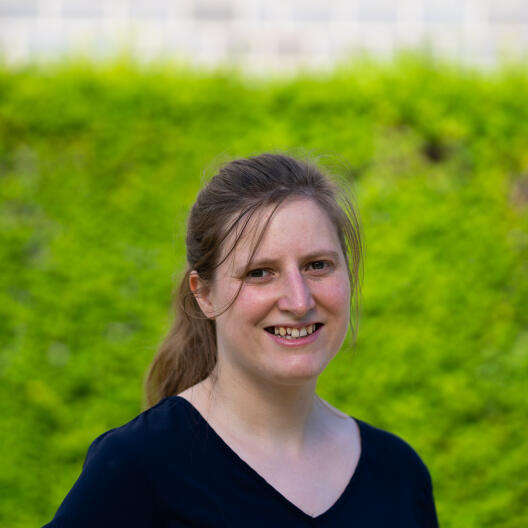“Curiosity and Interest Matter, Everything Else Can Be Learned”
In this interview Dr Karin Kleiner explains what helped her during her doctoral thesis, why she chose Münster as her research location and what fascinates her about electrochemistry.

You are currently supervising a doctoral student at the International Graduate School BACCARA. What is important to you in that context?
Karin Kleiner: I want to encourage students to realise their own ideas, to gain self-confidence for their projects and to follow their own way. I had those opportunities during my own doctoral thesis and it has helped me a lot.
What should young scientists, who decide on a career in chemistry, bring along?
Karin Kleiner: First of all, curiosity, interest and assertiveness! And of course, fun working in the laboratory. Everything else can be learned! I am an example myself: Topics such as accounting, controlling or other administrative processes don't exactly make my ‘research heart’ beat faster, but they simply belong to the whole story. I love being in the lab, realising ideas and making a difference. That's definitely not a classic 8-hour job, but it’s exactly what I want.
What has awakened your enthusiasm for research?
Karin Kleiner: Chemistry, biology and physics were already my favourite subjects at school. I was always fascinated by understanding how things work. In my doctoral thesis at a major car manufacturer, I then looked at ageing processes in batteries and in particular charge exchange. The idea arose to dive deeper and analyse this even further. And that’s what I do in my junior research group at MEET Battery Research Center.
What exactly is your junior research group "Mechanistic Understanding" working on?
Karin Kleiner: We study charge transfer and redox reactions in batteries. They have a major influence on battery performance and are therefore a key factor in optimised lithium-ion technology. Comprehensive, complicated analytical methods are needed to measure the difficult-to-measure changes that take place in atoms and their bonding during redox reactions. For this purpose, we develop new, complex characterisation techniques and evaluation methods that enable investigations “in operando”, i.e. in the cell during operation.
What distinguishes the work at battery research hotspot Münster for you?
Karin Kleiner: A highly competent, interdisciplinary team with extremely high international visibility works here. I myself came to Münster from London where I have done research before. MEET Battery Research Center, as well as the Department of Chemistry and Pharmacy at the University of Münster, combines extensive know-how in battery research with an excellent infrastructure and a broad range of topics. I work here in very different roles: As a teacher, as a scientist and I continue to learn a lot myself.
What do you hope for the future with regard to your work and the International Graduate School BACCARA?
Karin Kleiner: That I can continue to work in science in the future. I want to be involved in research ideas and help shape battery and energy research. Of course, I would like to see many motivated students at BACCARA who start their scientific career here.
Dr Karin Kleiner and her junior research group at MEET Battery Research Center investigate charge transfer and redox reactions in batteries.
